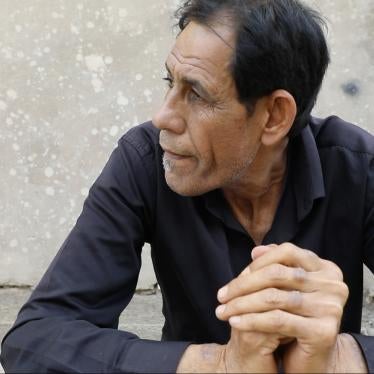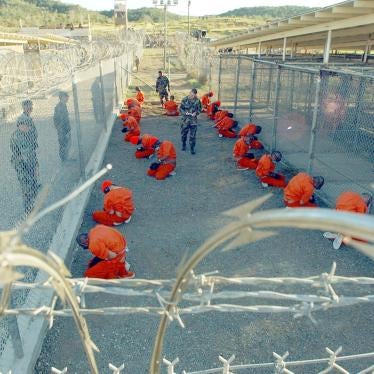As the U.S. Congress threatens to block funds for Khalid Sheikh Mohammed's (KSM's) civilian trial, critics of President Barack Obama's approach to prosecuting terrorism have a common refrain: KSM is a combatant, not a criminal. As Sen. John Barrasso recently put it, "These people are at war against the United States and our values. They deserve a military judge and jury."
But does KSM really "deserve" the honor of a military trial? That is a privilege normally reserved for defendants entitled to call themselves warriors.
It's no surprise that al Qaeda members would want to be seen as soldiers at war with the United States. Terrorist groups always want to be seen as warriors. Just think of the names they give themselves: the Lord's Resistance Army, Lashkar-e-Taiba ("Army of the Righteous"), or the Irish Republican Army, to name a few. The warrior mystique helps them to recruit glory-seeking young men to join their cause. It helps them justify the killing of their enemies and portray all of their victims as casualties of combat. It enables men like Osama bin Laden to portray themselves not as outlaws hiding in caves but leaders of great armies, confronting the world's superpower on a global battlefield.
When KSM was first brought before a military panel in Guantanamo, he reveled in the trappings of military justice. After confessing to the September 11 attacks, he said: "I did it, but this [is] the language of any war." In war, he said, "there will be victims." He then compared himself to George Washington, and said that if Washington had been captured by the British, he too would have been called an "enemy combatant."
It makes sense that a man who plotted the murder of innocent people from a refuge thousands of miles away would want to be seen as a soldier in a war. But why would politicians who claim to be tough on terrorism want to give him that status, as many Republicans do today? Why on earth do they think that facing justice in a civilian court, where the United States prosecutes murderers, rapists, drug dealers, pimps, and yes, terrorists (over 300 during George W. Bush's presidency), would be some sort of privilege?
Even if KSM stands accused of war crimes, it doesn't necessarily follow that he should be put before a military tribunal. The War Crimes Act, passed by Congress unanimously in 1996, gives federal civilian courts jurisdiction to prosecute grave breaches of the Geneva Conventions in wartime -- in other words, war crimes. Sen. Lindsey Graham, who is leading the Republican fight against civilian trials, says that the United States has never put combatants captured on foreign battlefields in civilian courts. That is flat wrong. The George H. W. Bush administration did that to Gen. Manuel Noriega, head of the Panamanian armed forces who was captured during the U.S. military invasion of Panama. Noriega demanded the right to be tried by fellow officers in a military court. The Bush administration conceded that he was a prisoner of war, but tried him before a civilian court anyway to drive home the point that he was nothing more than a drug trafficker.
If Osama bin Laden were captured alive tomorrow, what image would better serve the United States in the political struggle against al Qaeda -- an image of bin Laden in an orange Guantánamo jumpsuit brought before military officers, or one of the same man in plain clothes holding a serial number in an ordinary jailhouse mug shot? Which image would make him look bigger, and which smaller, in the eyes of his followers? Which would better convey America's confidence in itself and how it looks with contempt on those who murder civilians?
The second Bush administration got it right in 2003 when it put "shoe bomber" Richard Reid on trial before a federal civilian court (a decision to which none of Obama's current critics objected). Reid, who differed from the "underwear bomber" only in his choice of bomb-concealing clothing, also insisted at trial that he was a soldier at war with America. The judge in that case, William Young, replied:
"You are not an enemy combatant. You are a terrorist. You are not a soldier in any war. You are a terrorist. To give you that reference, to call you a soldier gives you far too much stature. Whether it is the officers of government who do it or your attorney who does it, or that happens to be your view, you are a terrorist. ... So war talk is way out of line in this court. You're a big fellow. But you're not that big. You're no warrior. I know warriors. You are a terrorist. A species of criminal guilty of multiple attempted murders."
That's what the choice of venue in the 9/11 trial should convey. That's what the Obama administration should say to critics who demand that the U.S. government treat terrorists as soldiers: You are giving al Qaeda what they want. You are elevating them to a stature they do not deserve.








